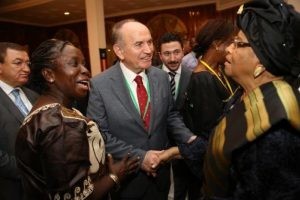
Dr. Kadir Topbas, mayor of Istanbul and UCLG President represents Local and Regional Governments in HLP meeting
The third meeting of the High-Level Panel on the Post-2015 Development Agenda took place in Monrovia (Liberia), from 29 January to 2 February and was hosted by H.E. Ellen Johnson Sirleaf, President of Liberia and Co-chair of the High-Level Panel of Eminent Persons.
The meeting’s main topic was “National Building Blocks for Sustained Prosperity” and convened discussions on Affecting economic transformation, Governance and institution building, Infrastructure and Sustainability and the necessity of Green Growth paths. Dr. Kadir Topbas voiced the views of local and regional governments and stressed that cities are motors of economic growth and that inclusive and sustainable cities are urban fabrics for future generations. “We need to use the power of cities to fight poverty. Cities are places for innovation and harmony among people”, he underlined.
UCLG President recalled that many cities are in the forefront of sustainable initiatives to reduce greenhouse gas emissions, to develop plans to adapt to climate change and mitigate natural disaster risks and promote the use of renewable energies. He emphasized the need to “localize” the future development agenda, as MDGs and targets cannot only be seen as global or national goals. Dr. Topbas called to address this deficit defining more specific targets and indicators for urban areas to:
- Reduce inequalities –ensuring universal access to basic services (safe sufficient water, sanitation, health care, quality education, transport)
- Improving the quality of life of slum dwellers and achieve the right to adequate housing–,
- Improving jobs and livelihoods income for the poor –supporting local economic pro poor policies specially adapted to informal sectors–
- Ensure environmental sustainability –improving risk prevention, reducing greenhouse gas emissions and promoting renewable energy sources in cities.
Local governments around the world also have a key role in supporting and shaping local economies and addressing poverty through strategies for promoting youth employment, empowering marginalized communities and promoting gender equity. Local authorities are at the forefront of pro-poor and inclusive local economic policies, stated Dr. Topbas, both in terms of creating an enabling environment for economic activities and also as a catalyst for development, by coordinating stakeholders and promoting partnerships with civil society and the private sector for basic services delivery.
He concluded by advocating for an explicit recognition of urban challenges and of local authorities as critical agents in the achievement of most of the MDGs, post-MDGs and SDGs: planning, monitoring and support for local and regional governments is critical if the post 2015 agenda wants to give greater attention to growing inequalities and sustainable urbanization. Attention must be directed to local institutional capacities in order to deliver their mandated services and responsibilities and important efforts need to be realized in strengthening the collaboration between all levels of government. “We need to listen to citizens and assure equal rights and services”, he finalized.
For more information please visit http://monrovia2015hlp.org/










